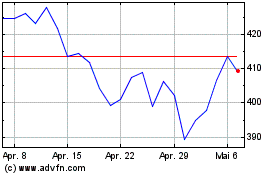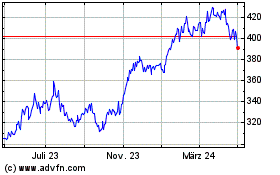By Eva Xiao
HONG KONG -- President Trump's suggestion that the U.S.
government take a cut from the forced sale of the viral Chinese app
TikTok sparked a new round of anger and reflection in China, as
TikTok's founder warned employees about "rising anti-Chinese
sentiment."
On Tuesday, a number of prominent figures in China, including
Google's former country head, lambasted the U.S. for unfairly
stifling China's first global internet hit -- while defending
Beijing's own restrictions on American technology giants.
The U.S. has "never offered any evidence for the accusations
against it, " venture capitalist Kai-fu Lee, who oversaw the China
operations of Alphabet Inc.'s Google from 2005 to 2009, wrote in a
private message about TikTok that was leaked and circulated widely
online on Tuesday.
The fate of TikTok, which the U.S. says poses national-security
risks to its 100 million American users, appeared to be thrown into
question over the weekend. On Friday, Mr. Trump floated an outright
ban on the short-video app, temporarily halting negotiations
between Microsoft Corp and TikTok's parent Bytedance Ltd. for the
app's U.S. operations. That fueled charges in China that the U.S.
was unfairly blocking a successful Chinese product.
But Mr. Trump's remark on Monday that the U.S. government should
benefit financially from the deal stirred a new wave of public
anger in China.
Hu Xijin, the editor in chief of the Global Times, a Communist
Party-backed tabloid, derided Mr. Trump's demand that the U.S.
Treasury receive a "very substantial" portion of the proceeds as
"open robbery."
"The world is watching and God is watching...how President Trump
is turning the once great America into a rogue country," Mr. Hu
wrote.
Meanwhile, Zhang Yiming, the 37-year-old founder of TikTok and
Beijing-based Bytedance, told employees Tuesday in an internal
letter reviewed by The Wall Street Journal to disregard any
"short-term praise or loss and patiently do the right thing."
Mr. Zhang acknowledged the geopolitical winds that the service
is facing, including in India, which was TikTok's biggest market by
app downloads until New Delhi banned the app following a deadly
border clash with China in June.
In a reflection of the pressure that the TikTok founder is also
facing at home, Mr. Zhang also restricted access to his personal
page on China's Twitter-like Weibo service after Chinese
social-media users slammed him for "kneeling" to the U.S. by
considering selling TikTok's U.S. operations to Microsoft.
The TikTok saga has reignited discussions around Beijing's own
restrictions on U.S. tech companies, namely the blocking of
Facebook Inc., Twitter Inc. and Alphabet Inc.'s Google, whose
services are inaccessible in China. The country's online censorship
apparatus, dubbed the "Great Firewall," bars mainland Chinese users
from accessing a host of websites and overseas platforms, including
news sites and social media, without technical workarounds.
Over the weekend, James Liang, co-founder and chairman of
Chinese online travel giant Trip.com Group Ltd., suggested taking
down the Great Firewall and opening the country up to Western
players -- a move that he said would "thoroughly smash" the
legitimacy of the U.S's TikTok policy. Mr. Liang's post was quickly
removed.
Trip.com didn't immediately respond to a request for
comment.
Mr. Lee, the former Google China head, wrote in his leaked
message that China was willing to grant access to foreign internet
firms as long as they obeyed Chinese law, including requirements to
store data in China and censor content. Google pulled its search
operation out of China after deciding it no longer wanted to follow
those rules, he said.
That, in addition to Mr. Trump's demand for a cut of the deal,
makes the U.S.'s handling of TikTok "not only incomparable with
Google, but also inconceivable," he wrote.
Sinovation Ventures, Mr. Lee's current firm, didn't dispute the
authenticity of the message but declined to comment further.
Beijing was quick to defend its own internet restrictions,
blaming the intransigence of American tech firms for their lack of
access to China's market. Companies must "strictly abide" by
Chinese laws, China's Foreign Ministry said Monday.
"Under this premise, we welcome any foreign enterprises to enter
the Chinese market," spokesman Wang Wenbin said, accusing the U.S.
of applying "double standards" in threatening to ban TikTok.
Mr. Hu's newspaper, the Global Times, said in an editorial
Sunday, "China has never banned US high-tech companies from doing
business in the country." TikTok, on the other hand, "fully
cooperates" with U.S. law, it said.
In China, consumer-facing tech firms are expected to cull
content deemed unacceptable by the Chinese Communist Party -- a
requirement that eventually pushed Google Inc. to exit from the
mainland market in 2010. On top of Google's struggles with
Beijing's censorship demands, its withdrawal from China was also
precipitated by a cyberattack the company traced to Chinese hackers
-- or what co-founder Sergey Brin called the "straw that broke the
camel's back."
On the other hand, U.S. platforms that operate in China,
including LinkedIn -- which was acquired by Microsoft in 2016 --
has faced criticism outside the mainland for censoring users based
in China.
While China's government may justify blocking foreign internet
companies for refusing to obey censorship rules, "censorship will
never be seen as a legitimate application of Chinese law by many
audiences outside China, " said John Lee, a senior analyst at the
Berlin-based Mercator Institute for China Studies.
At the same time, he said, the White House's citing of "national
security" in taking action against Chinese companies without
providing evidence "is damaging to the U.S. reputation as a
rule-of-law society and upholder of a global rules-based
order."
When it comes to the security of user data, every social-media
platform is vulnerable to hacking by governments no matter who owns
them, said Paul Haskell-Dowland, a cybersecurity expert at Edith
Cowan University in Perth, Australia.
"Any of these social media apps is only one update away from
being a spy operation," he said.
--Raffaele Huang and Rachel Pannett contributed to this
article.
Write to Eva Xiao at eva.xiao@wsj.com
(END) Dow Jones Newswires
August 04, 2020 10:09 ET (14:09 GMT)
Copyright (c) 2020 Dow Jones & Company, Inc.
Microsoft (NASDAQ:MSFT)
Historical Stock Chart
Von Mär 2024 bis Apr 2024

Microsoft (NASDAQ:MSFT)
Historical Stock Chart
Von Apr 2023 bis Apr 2024
